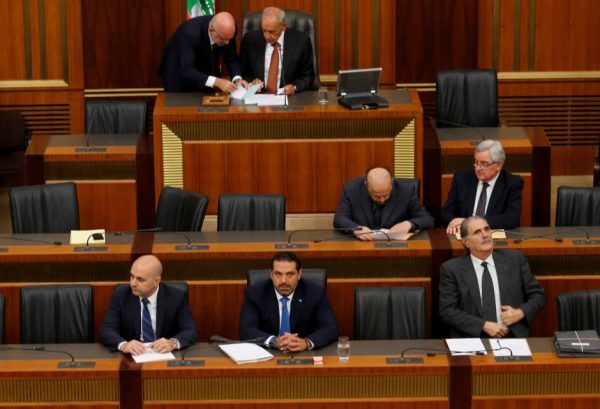
Lebanon’s parliament approved contentious taxes needed to finance a public sector pay rise on Monday and Prime Minister Saad al-Hariri warned the alternative was a collapse of the Lebanese pound in six months.
“Without taxes it would have been better in popular terms, but six months later the lira would have collapsed,” Hariri said after the parliament session.
Lebanon has a debt-to-GDP ratio of 148 percent, one of the highest in the world, and recorded a fiscal deficit of $4.9 billion last year.
Parliament approved a $917 million rise in public sector salaries and a series of tax increases to fund it in July.
Despite objections from business and some political groups, President Michel Aoun ratified the laws in late August and people have since begun receiving increased salaries.
But in September the constitutional council annulled the tax law after a political party brought a legal challenge and the council referred it back to parliament for amendments.
A key argument of those opposing increased taxes is that the Lebanese government offers little in return.
The country’s infrastructure has been awaiting repair since the 15-year civil war ended in 1990 – roads are clogged with cars, beaches are littered with waste, internet links are slow or patchy and cuts to power and water supplies are frequent.
ANOTHER CHALLENGE?
Sami Gemeyal, leader of the Christian Kataeb party which filed an appeal against the earlier version of the law, said it would do all it could to challenge it again.
“We will study it and see if it is possible to contest the law at the constitutional council,” said Gemeyal. Kataeb is the only major political party not part of Lebanon’s coalition government.
Lebanon expects to hold a general election next year and the public sector pay rises have proved a popular move.
Business leaders say Lebanon instead needs better tax collection, a credible economic plan and a budget to be passed for the first time since 2005.
CONTENTIOUS

The banking sector, the cornerstone of Lebanon’s economy, objected strongly to the law.
The changes raised corporation tax to 17 percent from 15 percent and also applies taxes on bank transactions in a way bankers say amounts to double taxation.
The effective tax rate on banks currently stands at around 15 percent, but would rise to around 50 percent if the proposed tax changes are enacted, Freddie Baz, Group Strategy Director of Bank Audi and board member of the Association of Banks in Lebanon (ABL) lobby group, told Reuters.
The laws have provoked a number of street protests, with people asking for pay rises and also protesting hikes which raised value-added tax (VAT) by 1 percentage point to 11 percent.
The head of Lebanon’s General Labor Union Beshara al-Asmar said before the vote on Monday there would be a “complete strike” which would ground the country to a halt if positive results were not achieved.
REUTERS

Leave a Reply
You must be logged in to post a comment.